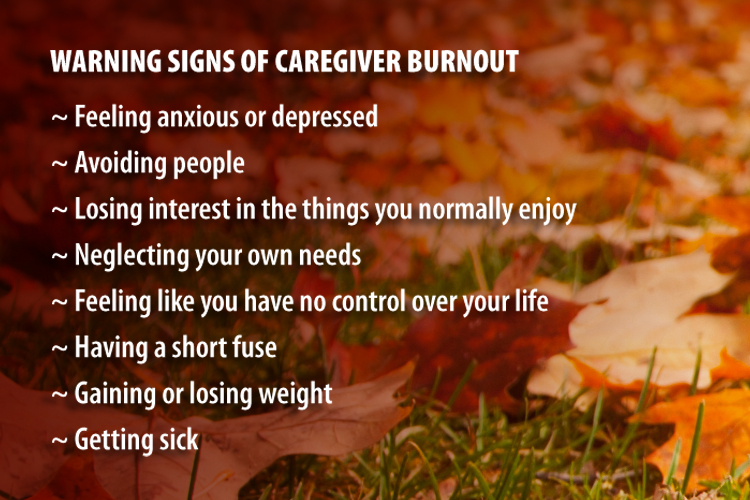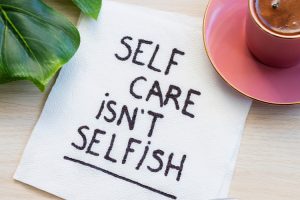
Posted: October 11, 2023
The role of caregiver for a loved one is one of profound love and dedication. While it can be immensely fulfilling, it can also lead to caregiver burnout if not managed properly. If you are one of the millions of Americans coping with aging parents, family members, or a spouse who requires daily care, you are at risk of developing caregiver burnout.
Most of us can relate to feeling overworked, over-stressed and overextended—in our “you can do it all” culture. But what if you’re the caregiver for a loved one who struggles to take care of themselves? It’s all too easy to put personal needs aside when a loved one relies on you to help them with all the normal tasks of everyday life. But this can be exhausting and detrimental to your emotional and physical health and without support, burnout can be a devastating consequence.
Caregiver burnout can manifest in various ways, including feelings of frustration, helplessness, anger, and guilt. Over time, these emotions can take a toll on both the caregiver’s physical health and their quality of life. The more you know about caregiver burnout, the better you can protect yourself from it.

Caregiver burnout is all too common when providing care for a loved one. In a survey by the National Alliance for Caregiving and AARP Public Policy Institute, 40 percent of caretakers felt emotionally stressed and about 20 percent felt physically strained.
There are warning signs before burnout occurs. Noticing the following signs should signal that it’s time to take steps to combat the stress you are under.
When you find yourself caring for a spouse with an illness and your daily routine revolves around their needs, it can be an incredibly lonely time. Social activities decrease, and friendships are neglected. The tasks of caregiving take over any free time. Loneliness and isolation can lead to depression and even thoughts of suicide.
Spousal caregivers often feel torn between caring for themselves or their partner. Many feel guilty for doing too little or too much. Some caregivers are unhappy with this unexpected role, and those feelings are valid. Caregiving can also take a toll on physical health.
The sandwich generation is a term given to those who are taking care of young children as well as an aging parent. Coping with one is difficult but caring for multiple individuals of varying ages can cause typically middle-aged caregivers immense stress and feelings of not being appreciated. All leading indicators of caregiver burnout.
Often these caregivers have jobs outside of the home, and many feel forced to sacrifice their careers to manage caregiving duties. This can not only lead to financial problems, but the transition can be a frustrating and difficult one.
 Caregiver burnout is a real and pervasive issue that can affect anyone providing care for a loved one. It’s essential to recognize the signs and take proactive steps to prevent or reduce burnout. Remember, caregiving is a marathon, not a sprint, and it’s okay to seek help and prioritize your own well-being. By implementing a few of the below strategies, caregivers can continue to provide love and support to their loved one while maintaining their own physical and emotional health.
Caregiver burnout is a real and pervasive issue that can affect anyone providing care for a loved one. It’s essential to recognize the signs and take proactive steps to prevent or reduce burnout. Remember, caregiving is a marathon, not a sprint, and it’s okay to seek help and prioritize your own well-being. By implementing a few of the below strategies, caregivers can continue to provide love and support to their loved one while maintaining their own physical and emotional health.
It’s important to remember that you don’t have to do it all. Ask family and friends to help with some of your caretaking tasks. Seek support from those close to you or a support group so you can process your feelings and emotions. At Cappella of Grand Junction, for example, we hold a monthly Memory Café, which is a safe and comfortable event where caregivers and their loved ones with dementia can socialize with others in a similar situation. It is a chance to enjoy food and drinks, listen to music, and take a break from the normal routine.
Make sure you take these regular breaks – they are necessary to help relieve stress, restore your energy and most importantly, prevent burnout. Social activities are important, so don’t feel guilty for continuing to do the things you enjoy that can get you away from the daily routine of caregiving.
 Remember, if you don’t take care of your own health, you can’t take care of someone else. Don’t put off doctor appointments for preventive care. Get plenty of sleep and eat a healthy diet. Exercise regularly to relieve stress, increase energy, and take time for yourself. Regular exercise can also boost your mood and help keep depression at bay.
Remember, if you don’t take care of your own health, you can’t take care of someone else. Don’t put off doctor appointments for preventive care. Get plenty of sleep and eat a healthy diet. Exercise regularly to relieve stress, increase energy, and take time for yourself. Regular exercise can also boost your mood and help keep depression at bay.
Consider taking family leave, if possible, from your full-time job. Removing the stress of work can reduce your responsibilities and free up more time for yourself.
Consider respite care for a few hours or even a few weeks if you start to feel stressed. When you need time for yourself, in-home services, such as a home health aide or an adult day center, can take care of your loved one. Senior living communities such as Cappella of Grand Junction may offer overnight care if you need a longer break.
When it is no longer feasible for you to continue as caregiver, it might be time to talk with your older loved one about moving to a senior living community.
Many adult children have mixed feelings about suggesting a senior living community to their parents, and some even feel guilty about it, but there are many advantages to senior living most don’t consider.
Not only can senior living communities offer a safe home for older adults with trained medical professionals nearby, they also provide plenty to do to keep residents’ bodies and minds active.
You can do much of the legwork in finding the right place for your loved one, including community tours, talking with friends who may be living in a senior community, and checking out the options that will be best suited for your parent, spouse, or loved one.
Learn more about Cappella of Grand Junction’s Memory Support and Assisted Living neighborhoods.